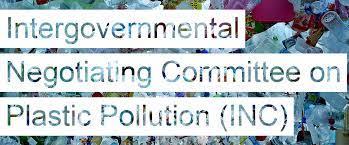
https://iucn.org/events/external-event/fourth-session-intergovernmental-...
At this fourth session, delegates will shift gears in the negotiation process as the INC will consider a Revised Zero Draft Text (RZD) – representing a nearly complete set of provisions and multiple options for each textual element. This text will form the core of the negotiations, and IUCN will continue its efforts to include biodiversity-specific language and terms in the future treaty, emphasizing the need for convergence, coherence and complementarity between different multilateral environmental agreements, including the Kunming-Montreal Global Biodiversity Framework, the High Seas Treaty, the Ramsar Convention on Wetlands, and the Sustainable Development Goals.
IUCN has been contributing to the discussions framing the adoption of the future Plastics Treaty, putting forward legal briefs specifically developed for the INC sessions, and the wealth of experience vested in the different constituents of the Union – from a legal, science, technical and policy standpoint.
Key messages
- Embedding nature and people as allies, as well as circular economy solutions in the treaty will be a critical step towards achieving the GBF, the SDGs, the commitments of the High Seas Treaty, and meeting the goals of the Ramsar Convention on Wetlands. So far, the Revised Zero Draft does not address the critical intersections between plastics pollution, circular economy solutions, trade and the related impacts on biodiversity.
- IUCN advocates for the inclusion of a specific article on “Biodiversity aspects” in Part II.8ter of the International Legally Binding Instrument (ILBI), following the Part II.8bis of the Revised Zero Draft, which currently addresses “Health aspects.” The proposed article would:
- Facilitate the coordination of obligations under existing Multilateral Environmental Agreements (MEAs) to reflect the trend of incorporating biodiversity and the alignment with the Global Biodiversity Framework (GBF) Targets.
- Ensure that the legal and scientific connections between plastic pollution, circular economy, and innovations across all phases of the plastic lifecycle and the protection of biodiversity are rooted in international law and in the national laws that implement the respective commitments.
- Advance the interlinkages between plastic pollution and biodiversity in the context of international trade law.
- While references to the connections between plastic pollution, circular economy solutions, and biodiversity and ecosystems protections are commonly found in preambular text of treaty instruments, IUCN asserts that the protection and restoration of biodiversity, and nature per se, must be incorporated in the legally binding control measures and enforcement terms of the ILBI.
- IUCN underlines the need for governments and companies to prepare comprehensive and inclusive nature strategies that link to concrete short- and long-term national action plans, and emphasises the importance of knowledge sharing, technology transfer, and collaboration across regions. In this regard, IUCN stresses the imperative of the full and effective participation of Indigenous peoples and local communities, women and girls, whose equality is a fundamental prerequisite for sustainable development, must be empowered and included to achieve our environmental, social, and economic goals of a just transition and a circular economy.









